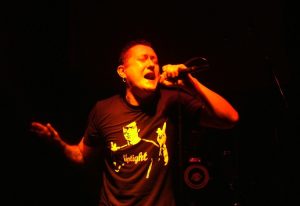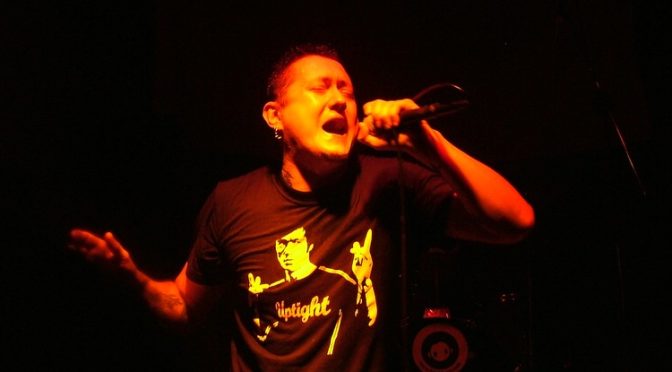One of the most eye-opening experiences when I first visited the Basque Country was the music. Growing up in the Basque culture of the American West, I was familiar with some of the traditional folk music (though never enough to truly appreciate it) but I had no idea about the radical rock that permeated modern Basque culture. This was a music that spoke to me, even if I couldn’t understand much of the lyrics. Two bands in particular made an impression on me – Kortatu and Negu Gorriak – both fronted by one of the Basque Country’s most popular singers – Fermin Muguruza.

- Fermin Muguruza Ugarte was born on April 20, 1963 in Irun, Gipuzkoa. He is the middle of three brothers, all three of which are musicians. As a child, he didn’t learn Euskara as it was prohibited in Franco’s Spain. In fact, he learned the language during tours when he was part of Kortatu. The choice of Basque as his language of expression was deliberate, a political choice in support of Basque independence.
- With his brother Iñigo, Fermin was one of the founders of Kortatu – he played guitar and was the lead vocalist. He was inspired to start the group after seeing The Clash in Donostia. Founded in 1984, Kortatu was one of the pioneering bands of Basque radical rock. In particular, the band introduced ska and dub to Spain. Their earlier records had songs in both Spanish and Basque, but with Kolpez Kolpe, everything was in Basque.
- After Kortatu dissolved in 1988, Fermin and Iñigo, again with others, formed their next band, Negu Gorriak in 1990. Negu Gorriak was one of the most influential Basque bands of the 1990s. They incorporated elements of rap, more hardcore rock, and Latin influences in their sound. In particular, they were praised for mixing different styles and sounds into a coherent whole. They were sued by a Guardia Civil officer who accused them of libel for a song where they suggested he was involved in drug trafficking. It wasn’t until 2001 that Negu Gorriak was acquitted by the courts. The band was very political, for example voicing support for members of ETA that were in prison and singing about fighting against the state. Their stance softened after a tour in El Salvador when they began singing more about dialog.
- When Negu Gorriak broke up in 1996 (though they played three concerts together after being acquitted), Fermin began a solo career that included collaborations with musicians from around the world. His solo work veered more towards ska and reggae than either Kortatu or Negu Gorriak had. More on his current projects can be found on his website.
- Fermin and other Basque groups faced boycotts in the early 2000s for their suspected sympathies for ETA. Fermin came out and said that, while he was “pro-independence and left-wing, but that does not mean that I am in favor of violence.” His political activism was also on display in 2002 when he accepted the award for Best Song in Basque and dedicated it to Egunkaria, the Basque-language newspaper that had been shutdown by the Spanish government.
A full list of all of Buber’s Basque Facts of the Week can be found in the Archive.
Primary sources: Fermin Muguruza, Wikipedia; Negu Gorriak, Wikipedia; Kortatu, Wikipedia
Discover more from Buber's Basque Page
Subscribe to get the latest posts sent to your email.



Listening to Fermin was one of the reasons I started to get interested and eventually trying to learn the language. Then, I found all the other bands and singers, among them Gatibu!
Aupa Fermin!! Also he directed the film Black is Beltza, a good film to watch.
¡WORD!
I’ll have to look up these bands, and just dropping a note to say that we truly appreciate your Basque history blog that is continuously updated with fresh facts and stories et al.
¡WORD!
Let’s GO DODGERS!
Let me know what you think! And thanks for the kind comments – always looking for suggestions if you have anything you think I should look into.
I admit, I’m a Mariners fan, so not so invested in the World Series… 🙂
Thanks for this info!